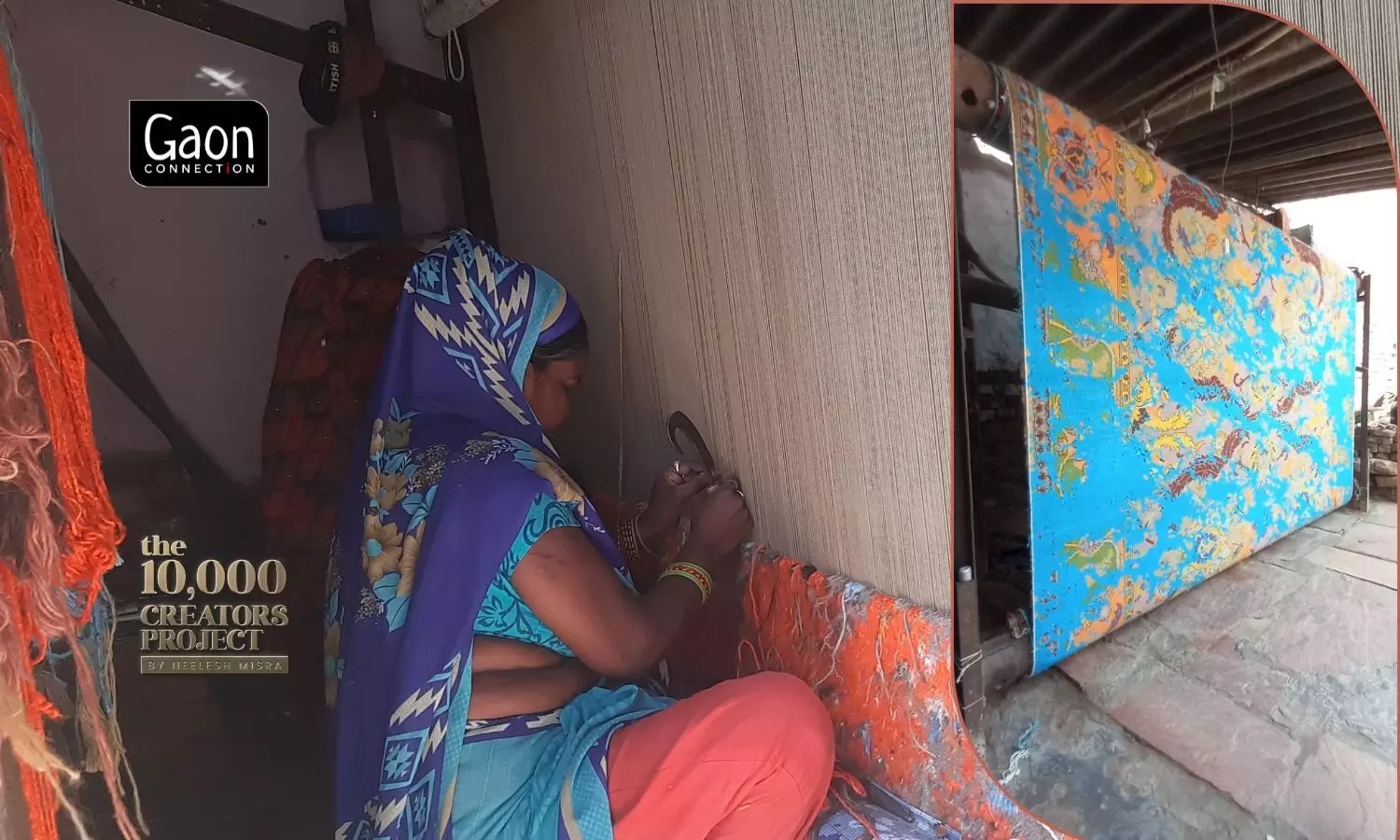The Galicha Makers of Dholpur
Women in Bahrawati village of Rajasthan weave carpets, locally known as galicha, which helps them earn a living. However, a part of their earnings go to the middlemen. Efforts are underway to directly link these rural women with the market.
 Manoj Choudhary 25 April 2023 1:53 PM GMT
Manoj Choudhary 25 April 2023 1:53 PM GMT

The galichas woven by the women in the village are taken by the middle men who send them to finishing units in Agra, Uttar Pradesh where they are washed, trimmed and readied for sale. Photos by Manoj Choudhary
Bahrawati (Dholpur), Rajasthan
Kanta Devi sits on the floor, weaving on a huge iron frame set up in front of her. Strands of yarn are tied to wooden beams on top of the contraption, and are tethered to the lower part where Kanta sits manipulating strands of orange wool as she refers to a pattern by her side every now and then.
Kanta is in the process of making a galicha or carpet. It is laborious and time-consuming work for the 35-year-old and she has been doing this work for the past 10 years. On a good day, she is able to weave about one and a half inches of the carpet.
“A six by ten foot galicha can take me anything up to three months to complete. I earn Rs 500 per square foot and pay the middle man a commission of Rs 50 a square foot,” Kanta told Gaon Connection, as Kinjal, her 10-year-old daughter, came up and sat next to her to help. The finished carpet sells at around Rs 30,000 in the market, Kanta said.
Along with her are Jamuna Devi and Radha Devi who are from the same family and they all live in Bahrawati village, in Saipau taluk, around 24 kilometres from Dholpur district headquarters in Rajasthan. The village has a population of over 2,500 people.
Also Read: Rajasthan: A Rural Woman’s Crusade Turns Nandpura Into an Alcohol-Free Village
There are plans in the pipeline to take the middlemen out of the equation.
“The male members of our family are engaged in either agriculture or daily wage labour and what they earn is insufficient to make ends meet,” Kanta Devi said. That is why the women folk decided to take up galicha making to augment the family income, she added.
Though Kanta Devi has been weaving galichas for ten years now, a new training programme in carpet-weaving was instituted by Manjari Foundation, a non-profit based in Dholpur.
“About 30 women in the village were trained in March 2020 of which about 10 are earning a living out of it,” Vinod Kumar, team leader with Manjari Foundation, told Gaon Connection. The rest 20 dropped out due to the laborious process and low financial returns. Apart from the training, Manjari Foundation also creates marketing opportunities and ensures loan facilities to the women through village level self help groups (SHGs), he said.
The galichas woven by the women in the village are taken by the middle men who send them to finishing units in Agra, Uttar Pradesh where they are washed, trimmed and readied for sale. The carpet companies that commission the galichas provide the machines free to the women.
The middleman installs the machine in the homes of the weavers and also provides the women with hanks of colourful wool and a pattern for the carpet to be woven. This has been the practice for many years, Kanta Devi said.
Also Read: Rajasthan: Migrant Villagers Return Home; Transform Their Village into a ‘Model Village’
But now, the women are trying to see if they can do away with the middlemen. According to Anita Devi of Bahrawati village, who also makes the galichas, many young girls are interested in the craft, but feel the money they can make from it does not justify all the hard work that goes into it.
“Presently middlemen take a big chunk of our earnings away as they bring us the job orders for the carpets,” she told Gaon Connection. If the women were empowered to do everything from start to finish, things would be much better for them, she added.
There are plans in the pipeline to take the middlemen out of the equation. “Manjari Foundation is trying to get the entire galicha-making process including cutting, finishing and packaging done in Dholpur itself. This would end the role of the middlemen and the women will earn more,” Vinod Kumar of Manjari Foundation, told Gaon Connection.
Also Read: Goat farming supports livelihoods in Rajasthan where agriculture is practically impossible
“There are many women in the village who are willing to take loans from the SHG in order to buy the machines and raw material to make the galichas,” Sujata Kumari from the Self Help Group, Siddhi Baba Rajivika Mahila Bachat Samiti, in Bahrawati, told Gaon Connection. Kanta Devi and Anita Devi are members of this SHG.
“We women feel we can take the orders for galichas directly from the companies. This will eliminate the need of the middleman. We are confident of earning enough to repay the loans in instalments,” Sujata Kumari added.
Dholpur #UttarPradesh #Rajasthan
More Stories




